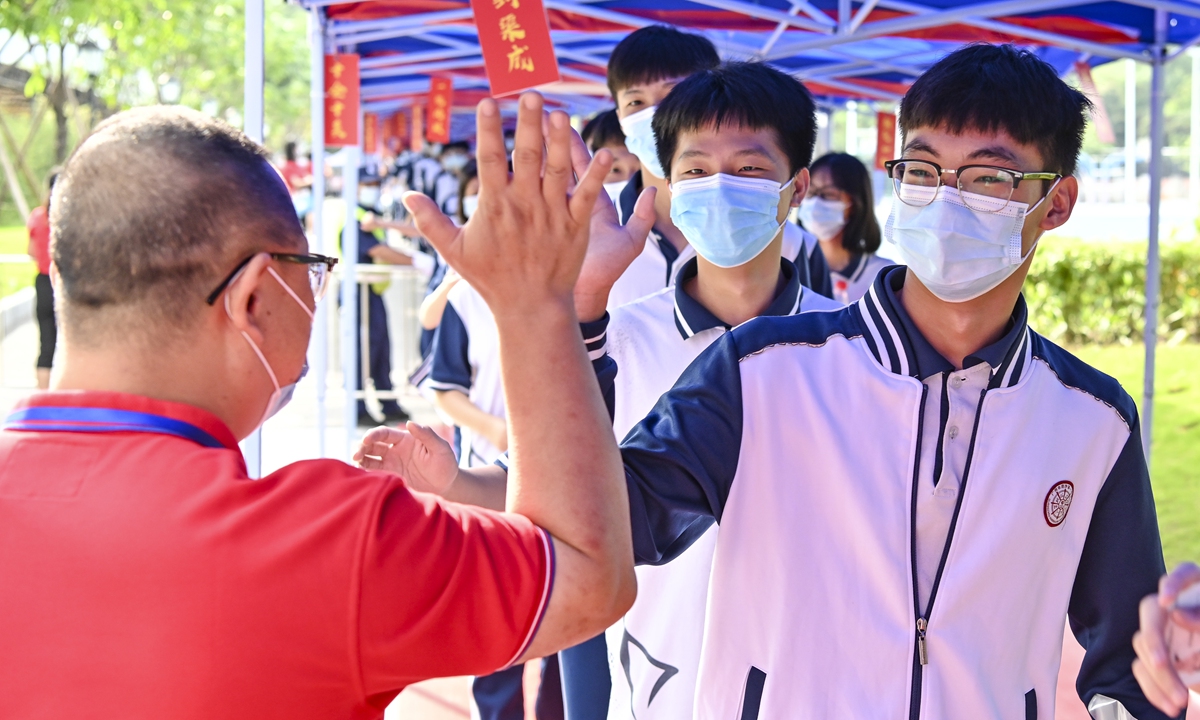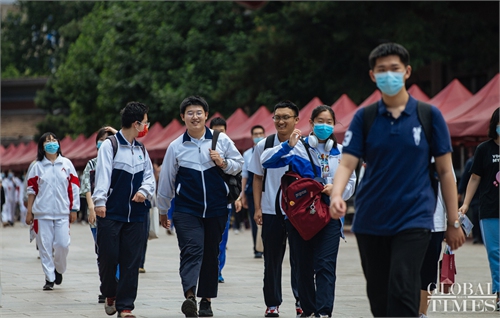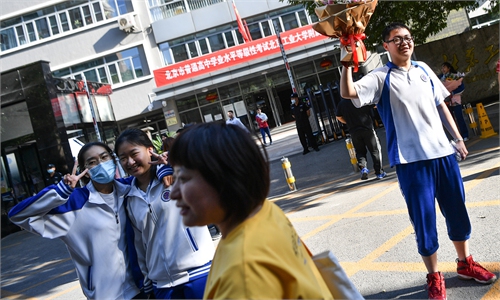
A teacher gives a high five to a student outside an examination point at a high school in Guangzhou, South China's Guangdong Province. A total of 10.78 million Chinese students across the country stepped into Gaokao examination rooms on Monday to take their final step toward college. Photo: VCG
China is getting ready for the national college entrance exam for 2022, known as the gaokao, with a record test takers of some 11.93 million expected to take the make-or-break exam — the largest gathering ahead of the 20th National Congress of the Communist Party of China (CPC). The event will test the country's hard-won epidemic control system, following sporadic flare-ups in multiple places.
This year's gaokao is the third to be held in the shadow of COVID-19. But drawing experience from the previous two years, observers believe local governments will make arrangements to ensure a safe and smooth examination season.
Chinese Vice Premier Sun Chunlan urged careful preparation work in the lead-up to the 2022 gaokao. A record 11.93 million people are expected to take the examinations at 330,000 sites.
Sun said the key is to implement health and COVID-19 monitoring for students and service staff during the exam, and take measures to guarantee every student who is eligible can take the exam, including those who are hit by the pandemic.
An expert from the Chinese Center for Disease Control and Prevention (CDC) told the Global Times on condition of anonymity that China has accumulated two years of experience in organizing students to participate in gaokao. Related anti-epidemic measures have been very stringent and no major outbreaks have ever been reported because of the exam.
Except for hard-hit Shanghai, which postponed its exams by a month, other provincial-level localities will kick off gaokao on June 7 as usual, though some places are facing sporadic flare-ups and small outbreaks.
A main challenge this year is that more students are affected, as the country is in a tough battle against the Omicron variant, the CDC expert said.
To make sure that everyone who is registered, including those who are infected or close contacts under quarantine, can take the exam, Beijing will arrange for COVID-19 patients to take the exam at the Ditan and Xiaotangshan hospitals, while gaokao candidates who are quarantined or live in sealed-off communities will take the exams at designated hotels or schools.
Many provinces including East China's Shangdong and Jiangsu require students to be at the places where they have registered to take the exam by May 24. They must conduct health monitoring and take at least two nucleic acid tests in the two weeks ahead of the exam.
A teacher surnamed Qiao from a boarding high school in Zhengzhou, Central China's Henan Province, told the Global Times that students have all been told to stay put and report their health situations for a week through an app.
Students were tested every two days in the past week and will be tested daily in the week prior to the exam. The high school is in charge of arranging the tests in collaboration with the local health institutes, Qiao said.
Like the previous two years, back-up classrooms will be arranged in case of an emergency and medical staffers have been communicating with the school about epidemic prevention, including routine sanitation, the teacher said.
Shanghai rescheduled its gaokao to July 7-9 due to the severe epidemic, and it has required students stranded in other places to return to the city by June 4. They are required at least five nucleic acid tests prior to sitting for the exam, according to local the authority.
To ease students' nervousness, Northeast China's Jilin Province will assign two psychologists at each exam venue.
The city of Zigong in Southwest China's Sichuan Province held a drill recently to practice how to deal with an epidemic-related emergency, such as students having a sudden fever on the test day.



